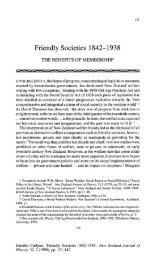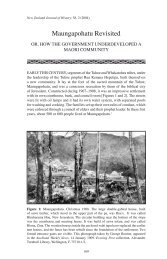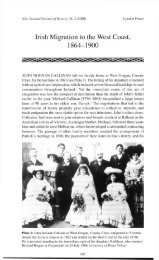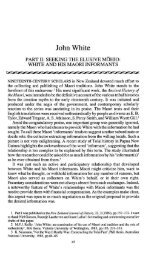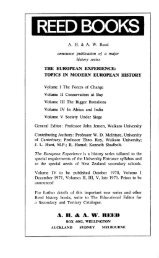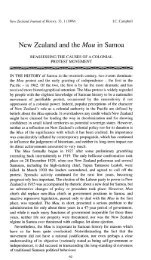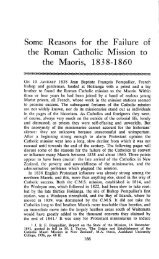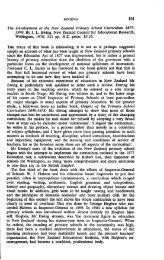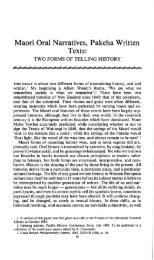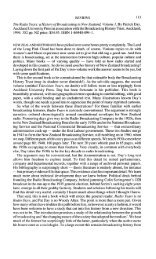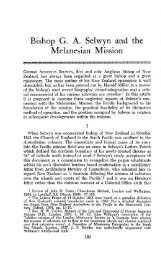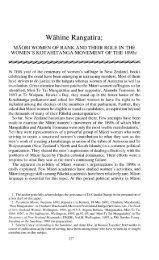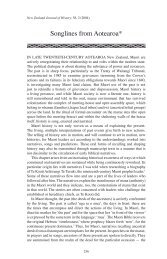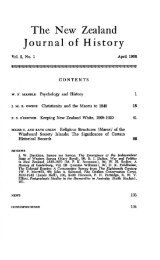Maori Oral Narratives, Pakeha Written Texts: - New Zealand Journal ...
Maori Oral Narratives, Pakeha Written Texts: - New Zealand Journal ...
Maori Oral Narratives, Pakeha Written Texts: - New Zealand Journal ...
Create successful ePaper yourself
Turn your PDF publications into a flip-book with our unique Google optimized e-Paper software.
MAORI ORAL NARRATIVES, PAKEHA WRITTEN TEXTS 17<br />
as a new objectivity, which enables people to see the past, and the present,<br />
afresh.<br />
People living in an oral tradition often come from the past into the present<br />
when they explain the present. The pivotal place where this is done in<br />
<strong>Maori</strong> society is the marae and its meeting-house. In the korero spoken on<br />
the marae and within the walls of the house, history is shaped. There is,<br />
then, a continuous dialectic between the past and the present, as the past is<br />
reordered and the present reinterpreted. The cycle of traditions about the<br />
people, land and events is dynamic, not static. For the <strong>Maori</strong>, the past is<br />
seen as that which lies before one, 'nga ra o mua', the days in front. It is the<br />
wisdom and the experience of the ancestors which they are confronting and<br />
seeking to interpret. The words of the ancestors exist still in memory,<br />
wrought into oral tradition, and they themselves can be encountered as they<br />
appear to the living in dreams. 'Nga kupu a nga tipuna' or 'nga kupu tuku<br />
iho', the words and phrases of the ancestors, take on new meanings in new<br />
contexts.<br />
In listening to the voices of the colonized, rather than the observations<br />
and reports of those who were the colonizers, a gap in perceptions soon<br />
becomes apparent. As Gillian Chaplin and I talked about Rua Kenana and,<br />
subsequently, Te Kooti Arikirangi we came to understand this with ever<br />
greater awareness. 4 The focus of attention is different; the sympathetic<br />
identifications are different; the encrustation of meaning around events is<br />
different. What for the Prime Minister in 1908, Sir Joseph Ward, was a<br />
minor, tricky political negotiation with a troublesome leader of Tuhoe, was.<br />
for Rua a 'Ceremony of Union' between himself and the Crown, a ritual<br />
which had been formally enacted and had, therefore, fundamental obligations<br />
for both parties. The final assessment, or what it all meant, was inevitably<br />
different.<br />
It is only relatively recently that Western-trained historians have come to<br />
realize that they have been perpetuating colonialist attitudes in their socalled<br />
objective histories. At the same time, these histories have served, to a<br />
considerable extent, to erase <strong>Maori</strong> memories and perceptions. As the<br />
great-granddaughter of the nineteenth-century prophet Te Kooti said about<br />
her ancestor:<br />
I didn't know anything about him. I used to hear how he was a rebel and all that, and<br />
I didn't think I was connected to him. Because we weren't encouraged to talk about<br />
Te Kooti and whatever he did, if he was a good man or bad man. We weren't. This<br />
was at home. I was in Standard VI [in 1928], and we were asked to write about Te<br />
Kooti and, well, I didn't know. I didn't know anything about him. I went home and<br />
talked about it, and was told to forget it. 'Don't worry about it! It is over! Finished.'<br />
I went back and told them [my parents] that my headmaster was threatening to strap<br />
me. Because I didn't know anything about Te Kooti. And I asked them — then. My<br />
4 See the introductions to Judith Binney, Gillian Chaplin, Craig Wallace, Mihaia: The<br />
Prophet Rua Kenana and his Community at Maungapohatu, Wellington and Auckland, 1979,<br />
and Judith Binney, Gillian Chaplin, Nga Morehu: The Survivors, Auckland, 1986.



